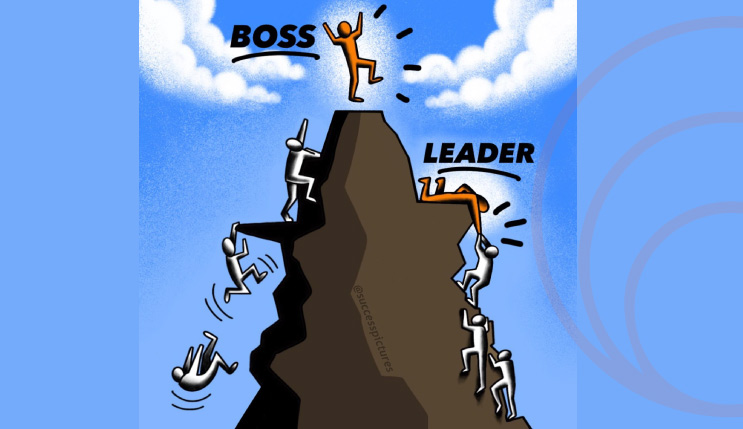31 Aug How a Boss Can Become a Leader (Part 2)

Welcome to the final part of our ongoing series: How a Boss Can Become a Leader. Last week, I wrote about 5 ways you can become a great leader:
- Leaders Are Inclusive
- Leaders Do Not Micromanage
- Leaders have Compassion
- Leaders Earn Respect
- Leaders Think Long Term
Today, let’s discuss these 4 additional ways bosses can become leaders.
Leaders Are Your Colleagues
What leaders should want to do is create a culture where everyone is the same. Flat hierarchies are becoming more popular because it removes the notion that someone is above you and better than you.
Everyone has something to offer, and everyone deserves to be treated the same. Motivating leaders are dynamic people who can flex their leadership style to match each person’s needs.
These leaders are often relationship builders. They are more interested in finding what motivates each employee to reach elevated levels of performance.
Motivating leaders care about the whole person and not only the employee’s role.
? In short, highly motivating leaders are social leaders who care about people and results.
Bosses, again likely to feed their ego, need to feel important and act like they are above you. Power corrupts, we have seen that many times throughout history, but smart leaders know that treating everyone as equals is a smart move.
Leaders Develop People
This one seems subtle, but what this one is all about is how people perceive those that work under them. I have had some great leaders who over the course of my learning and developmental journey acted as mentors, coaches, “go-to” person for support, advice or encouragement.
The last point about respect is related to this one. If you do not respect your employees, colleagues, your teams, you will use them, and look at them as machines that work for you.

True leaders will look at their employees as humans, with potential to grow and get better. Understanding this, leaders will work to develop people into future leaders, which in turn will make them look better.
Bosses do not have time to be bothered with concerns from their employees, whereas leaders will be available to meet with their employees frequently and give them constructive feedback to help them get better.
Leaders will take the time to get to know their employees and help them as much as they can.
Leaders Give Credit…Always
This is mostly a question of confidence and ego. Leaders do not care to get credit, even if they did most of the work. They are happy to give it up to the employees to make them feel proud and more engaged. The best leaders are also happy to take the blame, even if it was not their fault.

Again, to not disengage employees, they will be willing to take the blame if something goes wrong. Very few things will destroy employee morale and stifle future innovation more than having a supervisor take credit for somebody else’s idea.
Effective leaders understand that they never lose credit when they share the glory with their staff. When leaders highlight the contributions of others, they increase their employees’ self-confidence and raise their spirits — which improves future performance.
“When your team doesn’t trust you, you don’t get their best effort”
Bosses need that credit to feed their ego. Not only are some bosses not willing to take blame, but they are looking to see where they can assign blame, instead of moving on and solving problems.
Good leaders:
1) Give credit to those responsible for positive outcomes
2) Take ownership of negative outcomes
Leaders Are Focused On People
Your people are your best asset.
Bosses are often too focused on processes, and do not let their employees take risks and try new things.
Your employees have smart ideas, and they are eager to share them if you give them a chance. Using an employee engagement platform, leaders can get insight into how their employees feel about them on a regular basis.
If there is anything I have learned and apply everyday in running my Coaching & Mentoring business is that people-focused leadership creates a positive and open environment that brings people together to work in fantastically creative ways which are a real benefit to the company and the people who work for it.
I have developed over time, strong social skills, which can leverage the analytical abilities of team members far more efficiently.
Starting off a s a Team Leader managing the Income Management Team, this was much needed both for my team, our customer base, relevant partners, and stakeholders.
Having the social intelligence to predict how team members will work together will promote better pairings.
Often what initially appear to be task-related difficulties turn out to be interpersonal problems in disguise. One employee may feel devalued by another or think that she is doing all the work while her partner loafs – leading both partners putting in less effort to solve otherwise solvable problems.
I have become better at diagnosing and treating these common workplace dilemmas. Being able to focus equally on results and people motivate people to be their best, without losing sight of the bigger picture.
This balance enables them to achieve extraordinary results, because they do five things that few other leaders can accomplish.
None of the above has come to me overnight.
In fact, it has taken time, peaks and troughs, my bus journey compliment has been followed by some negative feedback, poor leadership on my part, and improvements.
Though we can all become leaders, it is not something we can achieve without real work and self-reflection. It is not about how many people are beneath you, but rather the people you elevate with you.
Emotional stability is something every single human being desires to cultivate and it is obtainable with these points in play, but (as with anything else) it requires a commitment to consistency.
Do you have what it takes?
If you enjoyed this article, please comment below, and remember to share with your friends.
Happy to discuss how the above applies to you and your business?

